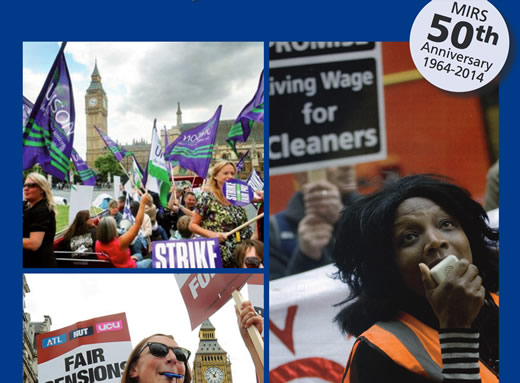
The Manchester Industrial Relations Society has just celebrated its 50th anniversary with a one-day national conference sponsored by Salford Business School.
The Society has strong links with Salford Business School – the position of Secretary of the Society has been located here since 1978. For the last 21 years, the role has been filled by me – the Business School’s own Professor of Employment Relations, Ralph Darlington.
Founded in 1964, the Society has mounted a continuous annual programme of meetings addressed by distinguished speakers from the industrial relations and human resource management world.
It is an important forum for the discussion of employment relations issues within Britain and internationally and benefits human resource management (HRM) students, academics and practitioners who want to understand the latest thinking in employment relations.
The Changing Face of Employment Relations over the Last 50 Years
On 21st November 2014 the Society’s 50th anniversary conference, which was held on the theme of The Changing Face of Employment Relations over the Last 50 Years, drew together over 200 delegates, including:
- industrial relations academics from across the country
- trade union officers from numerous unions (including the GMB, Unite, UCATT, PCS and NUT) the Trades Union Congress (TUC)
- Human Resource professionals from the Chartered Institute for Personal and Development (CIPD)
- officials from the Advisory Conciliation and Arbitration Service (Acas)
- labour lawyers from the Industrial Law Society (ILS)
- and postgraduate employment relations/HRM students.
The Salford Business School had a number of students who attended this conference as is evidenced by this tweet:
university of Salford fully represented at the Manchester Industrial Relations Society conference
Line-up of employment relations speakers
The conference listened to an unrivalled line-up of speakers, including:
- Sir Brendan Barber, chair of Acas,
- Mike Emmott, Employee Relations Advisor to the CIPD, and
- Paul Nowak, Assistant General Secretary of the TUC)
These individuals offered a fascinating reflective historical commentary on the changes and continuities over a period of fifty years of British industrial relations. They also referred to the wider and evolving European framework of employment regulation, as well as considering future challenges and prospects.
It provided an important testimony to the continuing theoretical and practical contemporary relevance of the field of employment relations, and in the process celebrated the Manchester Industrial Relations Society’s distinctive contribution since 1964.
Conference sponsors
The event was sponsored and financially supported by
- the CIPD
- Acas
- TUC
- British Universities Industrial Relations Association
- Salford Business School
- the Fairness at Work Research Centre at Manchester Business School
- Manchester Metropolitan University Business School
The Changing Nature of Work and Employment
The Conference started with an inspirational discussion about The Changing Nature of Work and Employment, by Professor Jill Rubery from Manchester Business School. This talk focused on four important features that have directly affected employment relations:
- ‘Feminisation’ of labour, especially part-time work and the attendant gender pay gap;
- ‘Flexibility’, which attacks the idea of labour as a stable resource, promoting flexible and transient careers;
- ‘Fragmentation’ of work across organisational boundaries and organisational types; and
- ‘Financialisation’, involving increased market de-regulation and global neo-liberal forcing shaping the conduct of employment relations.
The Changing Nature of Collective Employment Relations was a topic presented by Professor Paul Marginson from the Industrial Relations Research Unit, University of Warwick. Professor Marginson’s main question is “how and why has collectivism in Britain, as the main way of regulating employment, collapsed?”
The morning session of the conference continued with a presentation by Mike Emmott, Employee Relations Advisor for the CIPD, which reflected a transition From the Personnel Manager to HRM and beyond. Mike recounting his own personal journey as a British government civil servant involved in drafting policy and legislation on industrial relations, to advising on strikes and latterly CIPD policy.
full house listening to Brendan Barber
Sir Brendan Barber, chair of Acas followed on the Promotion of Good Employment Relations. His contribution underlined the need for a strategy of conflict management underpinned by Alternative Dispute Resolutions (ADR) as a way to promote good industrial relations, supported by Codes of Practice.
The Past and the Future of Trade Unionism
Paul Nowak from the TUC taking about the future of the trade union movement
In the first afternoon session Paul Novak, Assistant General Secretary of the TUC, looked at The Past and the Future of Trade Unionism. He argued for the need for a strong and effective national trade unionism and union representation, with union growth possible only by reaching to new types of workers who are at present excluded or marginalised (i.e. casualised workers in private sector) and by involving young generations of people in building unions.
The following intervention, by Professor Sian Moore from the Centre of Employment Studies Research of University of the West of England, focused on the important subject of Equality, Diversity and Employment Relations. A framework of ‘voluntary’ and ‘legal’ responses to work discrimination underlined the analysis on the decline in collective bargaining and the related increase in wage inequality. The need for a self-organisation, within and outside the workplace was argued in order to face, for example, the gender pay gap that still remains in the UK.
Professor Richard Hyman ‘where do employment rights come from?
The lecture by Richard Hyman, Professor of Employment Relations and Organisational Behaviour at the London School of Economics, detailed fundamental issues of State Regulation of Employment Relations: what is the State’s role in industrial regulation? How can the state be an industrial relations’ actor? What does it mean and what can be done?
The final presentation was by Professor John Kelly from the Department of Management of Birkbeck, University of London, who talked about Conflict: Trends and Forms of Collective Action. Professor Kelly reported on the known decrease in formal strike action in Britain, yet emphasised that strikes can have a positive effect on union membership by empowering people to challenge injustice.
Employee Relations: The International Journal
Following on from the conference, most of the presentations are being written up for publication in a special (bumper) 2015 issue of Employee Relations: The International Journal edited by me – in what is likely to be a seminal issue that will be an important teaching and research resource for many years to come. Discussions are currently taking place to explore the possibility of making it more generally accessible to practitioners in organisations like CIPD, Acas and the TUC, on the basis that it will be required reading for anybody who has either an academic or professional interest in industrial relations, work and employment.
PowerPoint presentation slides from the conference have also been made available on the MIRS website.
For further details on the Manchester Industrial Relations Society contact:
- Professor Ralph Darlington, Salford Business School, University of Salford, Salford, M5 4WT.
- Phone: 0161-295-5456;
- email: r.r.darlington@salford.ac.uk
- Manchester Industrial Relations Society website: www.mirs.org.uk
- Twitter: @ManchesterIRS


